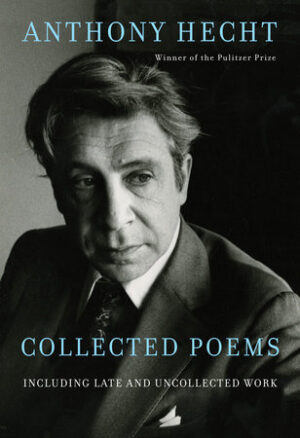Collected Poems: including late and uncollected work
by Anthony Hecht, edited by Philip Hoy
reviewed by Chard deNiord
Born in 1923, Anthony Hecht had a career that spanned most of the twentieth century before his death in 2004. His first book, A Summoning of Stones, was published in 1954, and his last, The Darkness and the Light, in 2001. Throughout his career he remained wedded to his formal muse, who insisted he write in blank verse or iambic lines that varied between trimeter and tetrameter. Hecht betrayed an unabashed love for the English tradition of formal poetry, and an open disdain for free verse, especially American. Sound was as important to him as meaning, maybe even more so, in an era when most of his peers—with the notable exceptions of Richard Wilbur and James Merrill—were abandoning form in favor of free verse.
There was something ironically Anglican about Hecht’s fierce loyalty to English prosody, especially given his Jewish ethnicity and the popularity at the outset of his career of Allen Ginsberg’s Howl, which didn’t seem to make the slightest impression on him. Propriety governed him down to his dress. This isn’t to say, however, that he shied away from difficult or even horrific subject matter—as in his most famous poem, “More Light! More Light!” which is a stark and timeless peroration on the horrors he witnessed as a soldier in World War II.
We move now to outside a German wood.
Three men are there commanded to dig a hole
In which the two Jews are ordered to lie down
And be buried alive by the third, who is a Pole.
Not light from the shrine at Weimar beyond the hill
Nor light from heaven appeared. But he did refuse.
A Lüger settled back deeply in its glove.
He was ordered to change places with the Jews.
Much casual death had drained away their souls.
The thick dirt mounted toward the quivering chin.
When only the head was exposed the order came
To dig him out again and to get back in.
No light, no light in the blue Polish eye.
When he finished a riding boot packed down the earth.
The Lüger hovered lightly in its glove.
He was shot in the belly and in three hours bled to death.
No prayers or incense rose up in those hours
Which grew to be years, and every day came mute
Ghosts from the ovens, sifting through crisp air,
And settled upon his eyes in a black soot.
Hecht achieves a verbal velocity and directness in “More Light! More Light!” that combines telling with a natural poetic diction and avoids the tendentious archness that emanates from many of his other poems.
In a startling shift at the very end of his life, Hecht abandoned his preference for regular metrics and rhyme and wrote several sublime free verse poems—as if he’d been waiting his whole life to break free from the strictures of form and, as Robert Lowell put it, simply “say what happened.” These moving, plangent lines are from his uncollected poem “Chromatic Fantasy and Fugue,” dated 2001:
A smoky beaded mist
shawls the white beach,
and somewhere
beyond our baffled eyes,
sand dollars
and chipped shells,
like alabaster headstones
savaged by tribesmen,
rest in gauze banks of pearls.
How pale the world has grown!
Cottages float away
in the filmy air
and the soft
whispers of the sea
soothe our familiar agitations.
I am (it says)
serene. I have bested grief.
The easy way
of eternity
in a soft singing
of choral voices
is mine, here
in the smooth sway
and cool opacity
of jellyfish.
Shadings of gray,
infinitely varied
compose and comfort.
Any “irritable reaching” after form is absent, leaving Hecht not only a spare verbal ease, but the beautiful, informal language that only the muse of his last few years could provide.
Published on October 11, 2024

